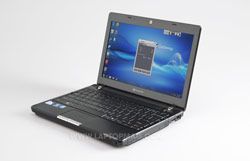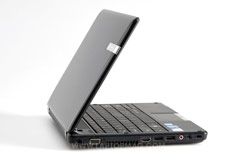Laptop Mag Verdict
Gateway offers long battery life and a built-in DVD drive in this sleek ultraportable, but you'll pay a premium.
Pros
- +
Comfortable keyboard and touchpad
- +
Built-in DVD drive
- +
Stylish design
- +
Nearly 8 hours of battery life
Cons
- -
Narrow touchpad buttons
- -
Logo badge scratches easily
- -
A bit pricey
Why you can trust Laptop Mag
In the age of software downloads, web apps, and streaming content, an ultraportable notebook equipped with a DVD drive feels almost quaint. But that's exactly what makes Gateway's EC14D07u stand out from other 11.6-inch laptops; it manages to cram an optical drive into its right side while still weighing a fairly light 3.6 pounds. For some, this feature will come in handy, especially those who have a large DVD collection or a Netflix account. For $629, the EC14D07u also features a peppy dual-core Pentium processor and nearly 8 hours of battery life. But should you pay this much when competing sans-optical-drive 11-inchers cost considerably less?
Design
Like the Gateway EC1430u we reviewed back in November of 2009, the EC14D07u has a solid build quality and a clean look with a small dash of flair. The system features a glossy NightSky Black lid (which didn't pick up too many fingerprints) and a textured black finish on the deck with tiny dots. As far as we're concerned, no gloss on the inside is a good thing. The chrome-like hinges and touchpad buttons serve as nice accents, and the lid has its own silver Gateway brand badge. While this is a nice touch, it picked up scratches within a couple days of use.
Measuring 11.5 x 8.3 x 1.2 inches, the EC14D07u has a similar footprint to the EC1430u but tacks on a few ounces to accommodate the DVD drive. The earlier Gateway model weighed 3.2 pounds, compared to the newer machine's 3.6 pounds. Nevertheless, we found the EC14D07U easy to carry.
Keyboard and Touchpad
Like its predecessor, this ultraportable sports a keyboard that's flat with a slight separation between the keys. The difference between the EC14D07u and Acer machines such as the Aspire 1410 and Aspire Timeline 1810T is that it uses a thinner font and that Gateway positions the letters in the middle of the keys instead of flush left. We found the keyboard to be plenty large for rapid and accurate typing, and appreciated the springy feedback. We also noticed less flex compared to the EC1430u. Our only nitpick is that the function keys are labeled with red icons, which can be difficult to see in low light.
The touchpad on the EC14D07u is relatively tall and wide, and we like that it's indented instead of flush with the deck. It offered a smooth surface for quick navigation of the desktop. The touchpad buttons are decently sized but still narrow and a bit loud for our tastes.

Click to enlarge
Heat
The EC14D07u got a little warm during heavy use, but generally kept its cool. After streaming a Hulu video for 15 minutes, we measured temperatures of 92 degrees Fahrenheit on the touchpad and 97 degrees between the G and H keys. The underside of the system registered 102 degrees; we consider anything above 100 to be uncomfortable.
Display and Audio
Surrounded by a matte bezel, the 11.6-inch glossy display (1366 x 768 pixels) delivered a bright picture with fairly good viewing angles. We had to tilt the display back only slightly to get the clearest picture. Colors popped when we watched a high-def clip of The Daily Show, and the EC14D07u had no trouble keeping up with the stream.
For an ultraportable, the EC14D07u pumps out a good deal of volume. The dual speakers located on the front lip of the laptop got fairly loud while streaming Green Day's "Boulevard of Broken Dreams" from Slacker. Surprisingly, we also heard very little distortion, even at the max setting.
Ports and Webcam
From back to front, the left side of the EC14D07u houses a VGA port, HDMI port, two USB 2.0 ports, headphone and mic jacks, and a Kensington lock slot. An Ethernet jack, third USB 2.0 port, and the DVD burner line the right side, with the 5-in-1 memory card reader resting above the drive. Up front is a convenient wireless on/off switch to the right of the speaker bar.
When we made a test call on Skype using the EC14D07u's integrated webcam, the other caller said we looked a little washed out and pixelated, though he didn't notice much in the way of motion blur. On the plus side, audio in both directions was clear.
Performance

Click to enlargeThe EC14D07u has the same 1.3-GHz Intel Pentium SU4100 ULV processor as the EC1430u we reviewed last year, along with a similar 5,400-rpm, 320GB hard drive. However, this notebook ships with 4GB instead of 3G of RAM. So we were a bit surprised when the EC14D07u turned in a slightly lower score in PCMark Vantage (2,613 vs 2,700). This score is also below what the Lenovo IdeaPad U150 (2,773) and the Aspire Timeline 1810T (2,938) turned in, but higher than the Dell Inspiron 11z (2,442) and Aspire 1410 (2,475).
Overall, this laptop proved plenty responsive in our day-to-day use, easily juggling multiple open browser tabs in Google Chrome. It also opened apps fairly quickly; WordPad and Adobe Reader 9 popped up in 2 and 6 seconds, respectively.
The hard drive booted up the 64-bit Windows 7 Home Premium operating system in a relatively sluggish 1 minute and 8 seconds. This is 7 seconds slower than the category average of 61 seconds. The EC14D07u completed the LAPTOP Transfer Test--in which we copy a 4.97GB folder of mixed media files--in 4 minutes and 18 seconds, for a transfer rate of 19.7 MBps. That's slower than the 21.2 MBps category average, as well as the 22.2 MBps score of the EC1430u.
Graphics and Video
Equipped with Intel's standard integrated graphics for this class of ultraportable, the GMA 4500MHD, the EC14D07u notched a respectable 3DMark06 score of 630. That's better than the earlier Gateway EC1420u (543) and IdeaPad U150 (590) but below the category average of 849. If you want to play anything more demanding than Flash games or casual titles, look elsewhere. This laptop mustered only 18 frames per second in World or Warcraft, and that was at the reduced resolution of 1024 x 768.
When we popped a Heroes DVD into the optical drive, playback was smooth and colors were well saturated. This ultraportable could easily double as portable movie player. Transcoding video was fairly brisk, thanks to this notebook's dual-core CPU; in Oxelon Media Converter we converted a 114MB MPEG-4 to AVI format in 1 minute and 58 seconds, only a bit behind the IdeaPad U150's 1:50.
Battery Life and Wireless
On the LAPTOP Battery Test (continuous surfing over Wi-Fi), the EC1430u six-cell battery lasted a very good 7 hours and 47 minutes. That's well above the 5:31 ultraportable average, and over an hour longer than the IdeaPad U150 (6:32). However, the EC1430u lasted 8:11, and the Timeline 1810 lasted 8:45. Still, everyone from road warriors to students will appreciate this notebook's endurance.
The 802.11b/g/n wireless card inside the EC14D07u delivered impressive data rates at both 15 feet (32.8 Mbps) and 50 feet (26.9 Mbps) from our test router. These numbers are well above the category average of 20.8 and 17.3 Mbps, respectively. Gateway does not include Bluetooth connectivity with this notebook.
Green Testing

Click to enlargeWhile the EC14D07u took a somewhat lengthy 4 hours and 4 minutes to completely recharge, it used (on average) a fairly low 24.2 watts while recharging. Its LAPTOP Battery Efficiency Rating (total watts divided by battery life) was also a low 12.4, which is about 7 points below the ultraportable average.
Configuration Options
The thirteen 11.6-inch models in Gateway's EC Series start as low as $399 without an optical drive. For that price, the EC1409u offers a slower 1.3-GHz Celeron processor, 2GB of RAM, and a 250GB hard drive. The $549 EC1430u we previously reviewed, also sans DVD drive, featured the same 1.3-GHz Intel Pentium SU4100 processor as the model reviewed here, along with 3GB of RAM and a 320GB hard drive. Stepping up to the $629 EC14D07u gets you an optical drive along with an extra gig of RAM. Models are also available with 500GB hard drives and a Cherry Red finish.
Software and Warranty
Gateway bundles the EC14D07u with a few of its own utilities, including MyBackup Solution and PowerSave Solution, as well as Recovery Management. You also get Microsoft Windows Live Essentials, CyberLink PowerDVD, and Microsoft Works, as well as trials of Norton Online Backup, Norton Internet Security 2009, and Microsoft Office Home and Student 2007.
The EC14D07u is backed by a standard one-year warranty with 24/7 tech support. To see how Gateway fared in our Tech Support Showdown, click here.
Verdict
The Gateway EC14D07u provides a good balance of performance and battery life while providing an added perk with its integrated DVD drive. However, this ultraportable costs $80 more than the optical drive-less EC1430u, which offers the same processor and similar endurance. And even though it's slower and has a more cramped touchpad, the $399 Acer Aspire 1410 is the best value in this category (assuming you're willing to live with a smaller 160GB hard drive). However, if you like the idea of watching (or burning) DVDs on the go or at home, this ultraportable may be worth the premium.
Gateway EC14D07u Specs
| Brand | Gateway |
| CPU | 1.3-GHz Intel Pentium SU4100 |
| Card Slots | 5-1 card reader |
| Company Website | http://www.gateway.com |
| Display Size | 11.6 |
| Graphics Card | Intel GMA 4500MHD |
| Hard Drive Size | 320GB |
| Hard Drive Speed | 5,400rpm |
| Hard Drive Type | SATA Hard Drive |
| Native Resolution | 1366x768 |
| Operating System | MS Windows 7 Home Premium (64-bit) |
| Optical Drive | DVD+R DL |
| Optical Drive Speed | 8X |
| Ports (excluding USB) | Microphone, Headphone, HDMI, Ethernet, VGA |
| RAM | 4GB |
| RAM Upgradable to | 4GB |
| Size | 11.5 x 8.3 x 1.2 inches |
| USB Ports | 3 |
| Video Memory | Shared |
| Weight | 3.6 pounds |
| Wi-Fi | 802.11b/g/n |
